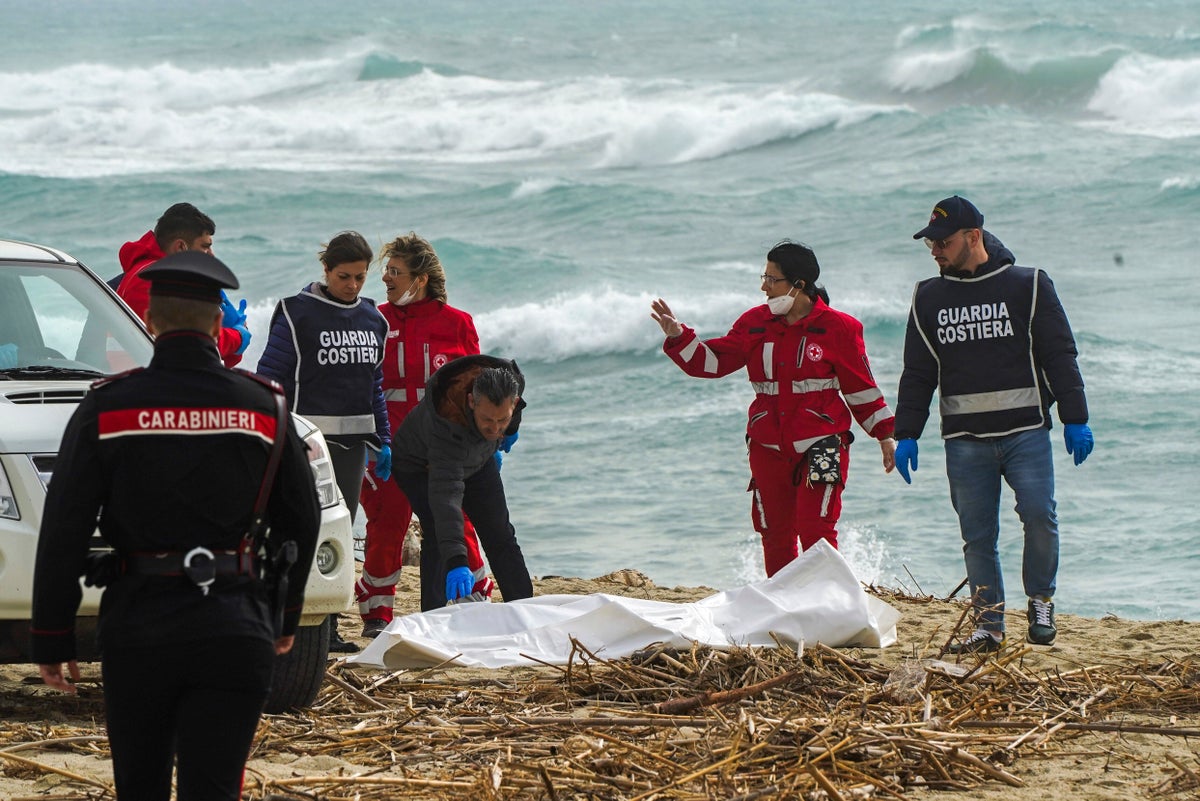
Rescue crews searched by sea and air Monday for the dozens of people believed still missing from a shipwreck off Italy’s southern coast that drove home once again the desperate and dangerous crossings of migrants seeking to reach Europe.
At least 80 people survived Sunday’s shipwreck off the Calabrian coast, but rescue crews recovered 60 bodies, including those of several children and the corpse of a young man Monday morning. Dozens more were feared dead given survivor reports that the ship, which set off from Turkey last week, had carried about 170 people.
The beach at Steccato di Cutro, on Calabria’s Ionian coast, was littered with the splintered remains of the ship that broke up in stormy seas on the reefs offshore, as well as the belongings the migrants had brought with them, including a toddler’s tiny pink sneaker and a yellow plastic pencil case decorated with pandas.
There were only a few life jackets scattered amid the debris.
On Monday, two coast guard vessels searched the seas north to south off Steccato di Cutro while a helicopter flew overhead and a four-wheel vehicle patrolled the beach. A strong wind whipped the seas that still churned up splinters of the ship, gas tanks, food containers and shoes. A pickup truck came to take away the body of the latest victim.
Firefighter Inspector Giuseppe Larosa said what gutted the first rescue crews who arrived on the scene was how many children were killed, and that the bodies of the dead had scratches all over them, as if they had tried to hang onto the ship to save themselves.
“It was a chilling scene. Bodies spread out on the beach, so many bodies, so many children," he said on the beach Monday morning. He said he had focused on the recovery efforts, but he was struck by what he found in the survivors.
“What struck me was their silence," he said. “Terror in their eyes, but mute. Silent."
Interior Minister Matteo Piantedosi, who has spearheaded Italy’s crackdown on migration, visited the scene Sunday and met with local officials in Crotone. At a news conference, he insisted the solution was to put an end to migrant crossings at their origin.
“I ask myself how it’s possible that these crossings are organized, pushing women and children to make the trips that end up tragically dangerous,” he said.
Italy's government under Premier Giorgia Meloni has focused on trying to block migrant ships from departing, while discouraging humanitarian rescue teams from operating in the Mediterranean. Meloni said Sunday that the government was committed to that policy “above all by insisting on the maximum collaboration with the countries of origin and departure.”
Italy has complained bitterly for years that fellow European Union countries have balked at taking in migrants, many of whom are aiming to find family or work in northern Europe. Italy is a prime destination, especially for smuggling operations launching boats from Libyan shores.
But Italy is also a destination for smugglers leaving from Turkey. According to U.N. figures, arrivals from the Turkish route accounted for 15% of the 105,000 migrants who arrived on Italian shores last year, with nearly half of those fleeing from Afghanistan.
European Commission President Ursula von der Leyen called for a redoubling of efforts to deal with the problem.
“The resulting loss of life of innocent migrants is a tragedy,” she said.
Meloni’s government has concentrated on complicating efforts by humanitarian boats to make multiple rescues in the central Mediterranean by assigning them ports of disembarkation along Italy’s northern coasts. That means the vessels need more time to return to the sea after bringing migrants aboard and taking them safely to shore.
Humanitarian organizations have lamented that the crackdown also includes an order to the charity boats not to remain at sea after the first rescue operation in hopes of performing other rescues, but to head immediately to their assigned port. Violators face stiff fines and confiscation of rescue vessels.
___
Nicole Winfield contributed to this report from Rome.







